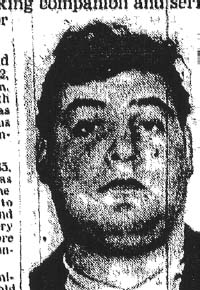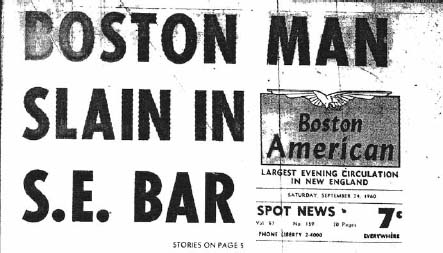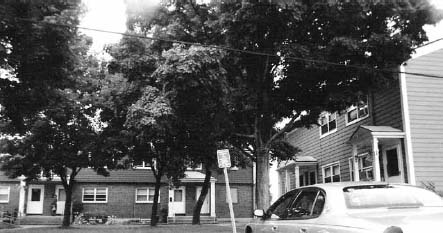Last Rites (5 page)
Authors: William J. Craig

Reflecting back on Angiulo's turbulent years of crime illustrates that although he tried to resolve mob problems without taking lives, there were necessary exceptions to this rule to protect the stability of the business. One particularly violent example occurred on November 12, 1959, when a worker in the Everett dump discovered the body of North End criminal Joseph “Augie” Demarco with six bullets in his head. The Everett dump was located about a mile from the city of Revere. Demarco was last seen in an after-hours club in Boston called the Coliseum, which was owned by the mob. A grand jury was convened in Middlesex Superior Court in Cambridge. The grand jury called six witnesses: Jerry Angiulo; Larry Zannino; Phil Waggenheim, a contract killer; Henry Noyes, a mob soldier; Peter Jordan, mayor of Revere; and Phil Cresta. No indictments were handed down. However, the unofficial story was that Augie Demarco was robbing Angiulo bookies. Augie's death served as a warning to other would-be criminals that Angiulo bookmakers were off limits. The fact that Revere mayor Peter Jordan was called to testify helps establish that the mob was firmly entrenched within the city of Revere and had protection from its politicians.
The Ebb Tide Lounge on Revere Beach Boulevard was a lounge and nightclub that was popular with the residents of Revere. The club was often frequented by off-duty Revere Police officers who were seeking an enjoyable night out with their wives or girlfriends. Often, the club would have live entertainment and a free buffet for the club-goers. Officially, the club was owned by Richard Castucci. His wife held the liquor license on the club because of his criminal record for forgery and various other charges. In later years, Richard Castucci was a FBI informant. One evening, a young Turk by the name of Joseph Barboza gave Castucci and his uncle, Arthur Ventola, the owner of Arthur's Farm, a hard time. Castucci spoke to Henry Tameleo and asked for protection. Tameleo granted the request. Almost immediately, word hit the street that the club was protected by the mob. The club was in operation from the 1950s until the 1970s. During this period, the club was owned and frequented by members of the New England mob. In fact, they used to have card and dice games upstairs. One night, Fats Domino went upstairs and decided to try his luck after playing to a sold-out crowd. While upstairs, he lost the money he had made for the evening and sold the house his jewel-encrusted cuff links so he could keep playing.
Another little-known secret of the club took place every Thursday afternoon. A nondescript vehicle would pull up to the club and a man would exit the vehicle and enter the club. A short time later, the man would leave the club and drive away. Unbeknownst to law enforcement, the man would then head to Rhode Island to give Patriarca his weekly share of what had been collected from local bookmakers by Angiulo. The Ebb Tide served as a collection facility for the Angiulo operation. Angiulo now had a very powerful partner, Raymond Patriarca.
A field report written by an unidentified agent of the FBI, dated April 15, 1975, stated that Castucci had recently purchased the Squire strip club located in Revere and that the previous owner was paying Anthony Cataldo, aka Max Baer, $250 per week in protection. Castucci, who also owned the Ebb Tide, was already paying Bulger weekly protection. Therefore, Castucci refused to pay Baer and Baer recruited his nephew, Butchie Cataldo, a Massachusetts state representative, to spearhead a crusade to try to close down the Squire or at least get the topless and bottomless dancers banned. The mayor of Revere at the time was William Reinstein, whose motto was “Let Revere be Revere.” At the time, Reinstein was indicted in a corruption scandal involving the city's new high school. He survived three mistrials. His field report raises an important question as to why Castucci was paying Bulger when originally he was paying protection to the mob. This bit of information should have tipped off the FBI that Bulger was starting to push the Italian mob out of its long-held territory. It may have also helped to give them some insight into the fact that the Patriarca-Angiulo reign was in jeopardy. On the other hand, it may have been that the Italian mob and the Winter Hill Gang were working together and splitting the take by the mid-1970s. Unfortunately, the FBI field reports don't give a clear and decisive answer either way.
C
HAPTER
4
T
HE
E
ARLY
Y
EARS
Sometime in 1955, a seventeen-year-old neighborhood kid with a propensity for violence began working for the Angiulo faction as a debt collector. His name was Edward “Big Eddie” Marino, and he stood at six feet, two inches, with a solid muscular frame, thick, curly, dark hair and movie star looks. Big Eddie was extremely well liked in the neighborhood; he was friendly, outgoing and always willing to help anyone in trouble. By 1960, at the age of twenty-two, he was married and living in an apartment on Everett Street in East Boston with an infant son, Edward, and his wife Corrine was expecting again. Big Eddie was steadily moving up within the Angiulo organization, proving himself to be loyal and trustworthy. In other words, he was a man among men. However, he was not yet a made man.
On the night of September 24, he found himself in the Famous Café, a bar in the South End of Boston. That night, he was drinking with a man when a fight broke out between the man and a woman. When the man began beating the woman unmercifully, Big Eddie stepped in and proceeded to give the man a taste of his own medicine. The fight was quickly over, and Philip Spataroâa thirty-five-year-old resident of Hanover Street in the North End of Boston who was a bartender and co-owner of the Famous Caféâordered the man to leave.
The fighting man walked back into the bar at close to closing time, completely unnoticed by the patrons, who had put the earlier altercation behind them. The man saw Big Eddie at the bar still sitting there, talking and laughing with his friends. He approached the bar and opened fire. Eddie collapsed to the floor, clenching his midsection, while the remaining twenty-five patrons ducked for cover. After the second shot, Spataro jumped over the bar and began to wrestle with the gunman, attempting to disarm him, when the gun discharged, hitting Spataro in the groin. The gunman then ran out of the bar on to Washington Street, where he fired another shot into the air before running up Dover Street. Boston Police Lieutenant John Donovan of the homicide squad said that police officers arrested a thirty-two-year-old South End man in a house on Middlesex Street. The gunman was in custody within two hours of the shooting. He was arrested by Sergeant George Bausch, Detective Thomas Carney, Patrick Hamilton and Edward Twohig. According to the police, the man was booked on suspicion of murder and assault and battery after being identified by Spataro at City Hospital. Spataro underwent surgery and eventually recovered from his wounds. Police thoroughly searched the premises on Middlesex Street, but the weapon was never found. Eddie died at the scene from two small caliber bullets lodged in his abdomen. The next day, U-2 pilot Francis Gary Powers was captured by the Soviets, Ted Williams announced his retirement, John F. Kennedy was preparing for his debate with Nixon and the
Boston American
's front-page headline read “Man Slain in S.E. Bar.” This one tragic event would have a devastating impact twenty years later.

Boston American
photo of Ed Marino.

The front page of the
Boston American
newspaper announcing Ed Marino's murder.
Corrine Marino now found herself having to raise a child and bring another into the world without a father or husband to help her along the way. Within a few months, she gave birth to a healthy baby boy, whom she named Vincent. As time went on, Corrine met and eventually married a loving and hardworking man named Donald Portalla. Don was very accepting of Corrine's situation, and they both decided that it was in the best interest of the boys to have Don raise them as his own and keep the tragic incident of their father's murder from them. Don and Corrine went on to have three more children, two boys and a girl.
The family settled in Revere and lived in the housing projects off Broadway. The housing complex was a series of quaint duplexes with front and backyards. Don and Corrine both worked extremely hard to provide a stable, loving and nurturing home for the children. The children attended the Shurtleff School with other neighborhood children. Corrine raised her kids to be polite, courteous, studious and hardworking. Corrine and Don had taken every precaution to ensure that their children would stay on the right path of life. The neighborhood kids might be out on the corner until all hours, but their children had curfews. Eddie, the oldest, worked at Vazzas restaurant as a chef while maintaining an A average and graduating from Revere High School in 1979. The following year, Vincent, who was nicknamed Gigi, also graduated from Revere High School. Gigi had been a standout athlete in football and was voted king of the prom, elected to the student council and had aspirations of becoming a Massachusetts State trooper. Since the age of thirteen, Gigi had worked in a local store slicing deli meats. Both boys had played instruments in the Saint Anthony's Church marching band. Eddie was accepted and enrolled in Bentley College and studied accounting. Gigi had enrolled at Bunker Hill Community College and began taking legal courses to help him pursue his dream of law enforcement. Don and Corrine Portalla had managed to help their children evade the pitfalls that so many young Revere kids can't help but trip on during their adolescent years.

The Portalla homestead in the Revere projects. The apartment next to the one with the window boarded up is where the family lived for almost twenty years.
Around this time, Corrine's father became gravely ill. As a last request before his passing, he asked her to promise that she would tell the boys the long-held family secret of their biological father. Reluctantly, she complied with his deathbed wish.
Once the family secret was revealed, it hit Gigi as strongly as when Paul was converted to Christianity by being stricken blind while on the road to Damascus. Gigi was now confronted with a dilemma: reject Eddie, his birth father, and his criminal behavior; or embrace his true father and inevitably become like him. Incapable of weighing the consequences of this greed gone mad, he had to make a choice that would shape who he was and who he would become. Eddie took the news a bit more in stride. Both boys wanted to know more about their hero father who had been cut down in his prime.
In 1981, Gigi went to the Angiulo headquarters in the North End of Boston on Prince Street. Jerry Angiulo was more approachable than most underworld figures. He was always willing to talk to the people of the neighborhood. This kind of goodwill helped to keep him insulated from law enforcement. Gigi approached him with the intention of working for him. Angiulo attempted to pacify him by saying that he was busy, but perhaps he could see him another time. Nevertheless, Gigi insisted, saying, “No, no you know my father. My father worked for you. He got killed, but I'm here and I wanna work for you guys, just like my father did.” Still, it was to no avail; his pleas fell on deaf ears. But Gigi left determined to follow in his father's footsteps. During this same time, he took the Massachusetts State Police exam in hopes of possibly still becoming a trooper and making his mom proud and his dream a reality. He scored a ninety on the exam, which is truly impressive. Unfortunately, the state of Massachusetts had just implemented Proposition 2½, which severely limited spending statewide. This legislation meant that Gigi would not be hired since his test score was not high enough and he did not have veteran's status, which would raise him on the list of potential new troopers to be hired.
